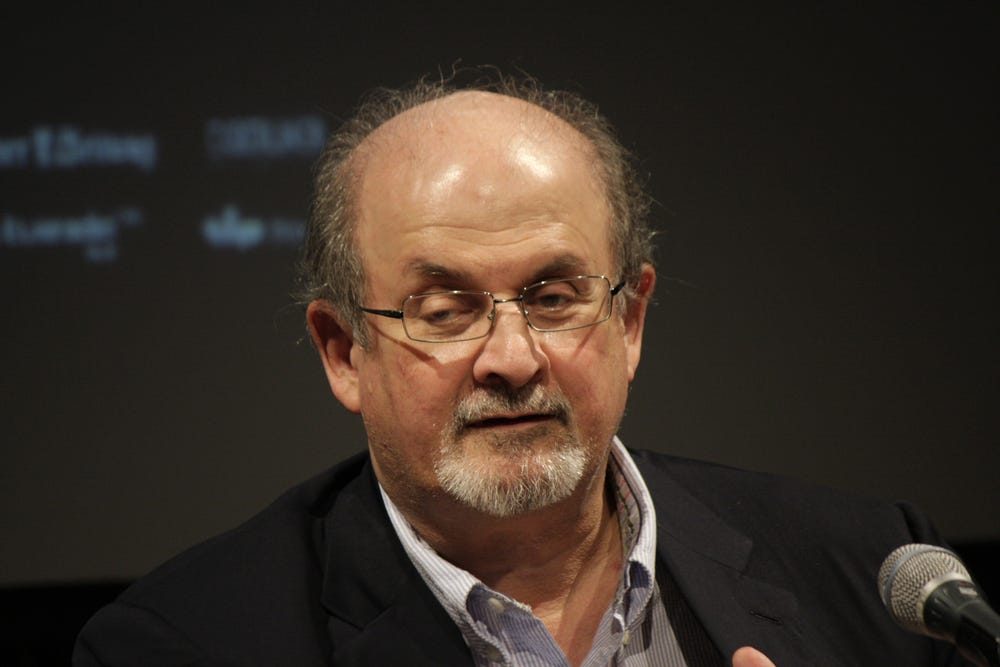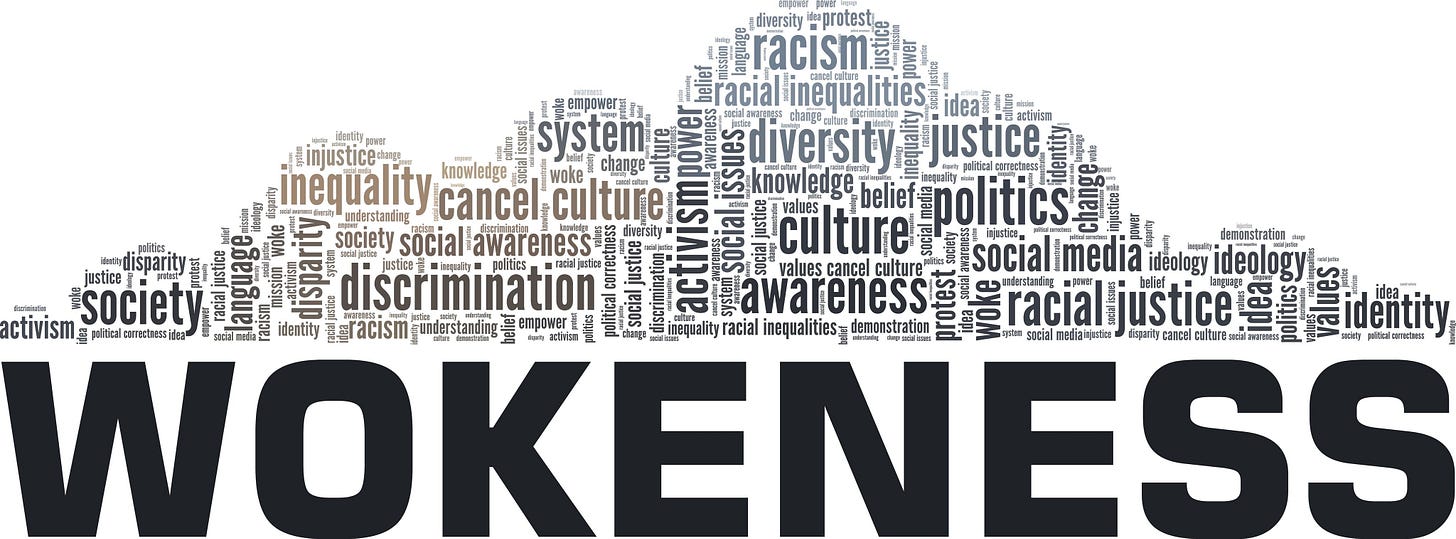E-Pluribus | August 18, 2022
One woman's 180 on Salman Rushdie, the illiberalism of wokeness and illiberal responses, and a former college professor explains what drove him out.
A round-up of the latest and best writing and musings on the rise of illiberalism in the public discourse:
Ayaan Hirsi Ali: I once wanted to burn ‘The Satanic Verses.’ Now I weep for Salman Rushdie.
When it comes to death threats, Ayaan Hirsi Ali knows whereof she speaks, being the target of hatred and vitriol for years now. But at one point in her life, Ali admits, writing in the Washington Post, she was the one making the threats. But having seen the harm caused by Islamic fundamentalism and growing illiberalism in more mainstream ideologies, Ali says we must be more vigilant than ever.
The freedom to speak out — to challenge and even to offend — is the driver of every form of progress. The advance of science, the emancipation of women, revolutions that have taken down monarchies and corrupt regimes — these achievements, at their core, were driven by free expression.
Soon after the 9/11 attacks, Rushdie wrote: “The fundamentalist seeks to bring down a great deal more than buildings. Such people are against, to offer just a brief list, freedom of speech, a multi-party political system, universal adult suffrage, accountable government, Jews, homosexuals, women’s rights, pluralism, secularism, short skirts, dancing, beardlessness, evolution theory, sex.”
Speaking as a former teenage believer, I concur: Islamic fundamentalism is a wholesale assault on the foundational principles of the West. We must not only protect but also stand alongside those whose lives are threatened by theocracy merely for what they say or write.
When someone attempts to take Rushdie's life, what’s at stake is not just the inventive language and far-sighted vision of one person. Also at stake is our freedom to share ideas: the lifeblood of Western civilization.
But in place of the courageous confrontation and unified defense that such an assault demands, I see around me today far too much shuffling of feet and mumbling. What ought to have prompted simply a resounding defense of free speech has stirred, from some on the left, criticism of the act itself, but hollowed out by caveats: I believe in free speech … but not if this or that minority is offended.
The secular cult of wokeism uses diversity, equity and inclusion — words that should be pillars of progress — to impose a fearful conformity that is fundamentally inimical to free speech. Indeed, the wokeists and the Islamists have this in common: Both use the language of offense and hurt feelings to shut down ideas. “Hate speech” can be just a secular version of “blasphemy.”
Read it all here.
Glenn Loury, John McWhorter, and Kmele Foster: Racial Identity, Abolition, and Reckonings
Drawing on a conversation with John McWhorter and Kmele Foster during the 2022 Heterodox Academy Conference, Glenn Loury admits to some differences with Foster on the place of race in one’s self-conception but gives Foster the opportunity to expand on his views. In doing so, Foster expresses frustration with, yes, wokeness, but also with those who go too far in resisting it and end up violating free expression themselves.
[Kmele Foster]: I'm frustrated by two things. One is that when I look at something like education, which has been the center of the culture war for a while, the K-12 education system in the United States fails many, many, many children profoundly. And it was doing that before the pandemic, and post-pandemic it's doing so to an even greater degree. And I think there's something almost criminal about the fact that we've devoted so much of our energy arguing over who gets to decide what kind of political propaganda is going to go into the history curriculum or whether or not merit is racist. It's just really disheartening, and to the point where I almost get a bit emotional.
And the other thing that I've seen that makes me very frustrated is that it is traditionally the case that there are a lot of people on the right who share some of our concerns about the culture broadly and race issues. But amongst their ranks, I think there is a lot of reactionary fervor and a growing sort of illiberalism there that is disconcerting to me. To the extent I'm concerned about “wokeness,” I'm concerned about the illiberal attributes of it, the kind of circular reasoning, the reduction of people to their immutable characteristics, the unwillingness to hear and to engage in constructive arguments.
And I see way too many elements of that, way too much kind of performative nonsense from conservatives who say they're doing it on the basis of principle, but for the most part seem to be interested in wielding a cudgel against people who they, in many instances, don't seem to believe they can beat culturally. They see the New York Times and all these other elite media organizations as kind of arrayed against them in this cultural battle. And they think that the only thing they can do is pass a law to stop them, to break them up in some way, to punish Disney for having gay characters in an animated movie, which just … there may be legitimate issues there, but there's something about it that I just find really pernicious.
Read the whole thing.
William Deresiewicz: Why I Left Academia (Since You're Wondering)
In a very transparent piece for Quillette, former Yale professor William Deresiewicz explains why he got out of higher education. Pressure to research and publish has marginalized actual teaching to such a degree that professors who prefer the latter become persona non grata, unsuited for a place on a university campus.
Here’s why I left: I didn’t have a choice. I not only failed to get tenure at Yale—which was completely expected—I failed to land another job anywhere else. Let me explain how it works. When you are hired as an assistant professor, after you complete your PhD, at a leading research institution like Yale, the hope is not that you’ll get tenure down the line. That almost never happens; for tenure at a top school, you need to stand among the foremost leaders in your field, and very few people are capable of establishing that kind of reputation in the space of six years. No, the hope is that you’ll stay awhile, publish, then jump to another job somewhere else, somewhere that will tenure you. That’s exactly what I saw among the junior faculty who preceded me in the English department. They got jobs at places like Northwestern, Northeastern, Smith, UNC, and the University of Kentucky. And that is what I thought that I would do, as well.
[ . . . ]
The other thing I believed in was writing for a general audience: participating in the wider culture, sharing my love of art, sharing my understanding of art. Communicating with people beyond the narrow circle of fellow subspecialists. I had done this in graduate school, as a dance critic (one of the reasons it took me nine years to finish). I continued to do it, at Yale, as a book critic and, eventually, an essayist. I thought that it was something academics ought to do, a way of contributing to society, but mainly I did it because I liked to. I liked to write: to tinker with sentences, to make sounds and patterns with words, to give myself, and hopefully others, a thrill. I liked the chance to read like a reader, not a professor, the way I used to read, and, since my specialty was 19th-century literature, to read contemporary fiction, to find out what novels were saying about the world that I was living through. I liked having a presence in that world. It certainly seemed a better use of my ability than writing another journal article.
The problem with spending time with students, or on students, or writing book reviews or essays, is that none of those activities do anything for you professionally. Academics are rewarded for one thing and one thing only: research. Scholarly publication. Nothing else counts; anything else is a step toward professional suicide. I knew this, of course, and it tormented me. But, to quote a phrase, I could do no other. I believed in what I believed in, and if I had to do it the other way, the way you were supposed to—shaft my students by doing the minimum for them, enclose my mind completely within the profession—then I would rather not do it at all. Besides, I didn’t think that I could put my soul aside for 10 or 20 years and still be able to find it at the end.
Read it all.
Around Twitter
A thread from Noah Smith on the incredible surveillance system the Chinese government has in place to monitor and control the populace:
Here’s a short back and forth between Jonathan Chait and Ross Douthat on illiberalism and the political dynamics in American politics:
And finally, perhaps fanatical Christian zealots are not behind every instance of “book banning”? From Texas:










